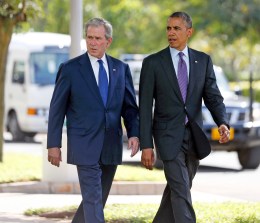
From left: former President George W. Bush and U.S. President Barack Obama attend a memorial for the victims of the 1998 U.S. Embassy bombing in Dar es Salaam, Tanzania, on July 2, 2013.
An American president says a Middle Eastern country has weapons of mass destruction. He builds a “coalition of the willing” for a military strike against said country.
Sound familiar?
It could be President Barack Obama in 2013 or President George W. Bush in 2003, or so fear liberal Democrats leery of getting involved in yet another war in the Middle East.
“While the use of chemical weapons is deeply troubling and unacceptable, I believe there is no military solution to the complex Syrian crisis,” Rep. Barbara Lee, a California Democrat who famously was the only member to vote against authorizing the war in Afghanistan, said Tuesday in a statement on her Facebook page. “Congress needs to have a full debate before the United States commits to any military force in Syria — or elsewhere.”
But Obama, who ran on a platform in 2008 of ending Bush’s wars in the Middle East, isn’t Bush, and there are important distinctions between the two scenarios. Here are six ways Syria 2013 isn’t Iraq 2003:
Regime change
Bush made no secret that his plan was to topple Iraqi President Saddam Hussein. This time around, the Obama administration is taking pains to say that ousting Syrian strongman Bashar Assad is the last thing they want as it would only create a power vacuum the disorganized Syrian opposition isn’t ready to fill. “I want to make clear that the options that we are considering are not about regime change,” White House spokesman Jay Carney told reporters Tuesday. “They are about responding to a clear violation of an international standard that prohibits the use of chemical weapons.”
A limited engagement
U.S. officials are looking at a two-day, limited strike on Syria, which would not involve any American boots on the ground — compared to the 130,000 U.S. troops Bush had already mustered on Iraq’s borders by the time he declared his intentions to the public. The purpose in Syria is to punish Assad so that he knows he cannot use chemical weapons against his own people with impunity. Striking the weapons themselves could potentially create too much collateral damage, so Syrian military sites are being selected. Whereas Bush envisioned five months in Iraq — which turned into 10 years — Obama hopes his engagement will be counted in days, not weeks.
Arab support
Most of the Arab world opposed Bush’s invasion of Iraq. The entire Arab League except Kuwait condemned the war. And Turkey denied the U.S. use of its military bases. This time around, most of the Arab world, with the exceptions of Iraq and Lebanon, supports strikes against Assad, and Saudi Arabia and Turkey are in talks to potentially participate in the military operation.
European support
Remember Freedom Fries? France and much of Europe weren’t wild about going to war in Iraq. France is now spearheading the effort to oust Assad, although Germany and southern Europe remain skeptical of military involvement. Britain, of course, was as much on board with Iraq in 2003 as it is with Syria in 2013.
WMDs
This time, there’s next to no doubt they actually exist. The pretense for the war in Iraq was disproven: Hussein’s alleged WMD stockpiles were never found. In this case, the international community has, with the exception of Russia and Iran, accepted and condemned the use of chemical gas in Syria last week that killed as many as 1,300 people.
Congress
Bush asked for and received overwhelming permission and support from Congress to invade Iraq. When asked, Carney on Tuesday said Syria poses a “significant challenge to or threat to the United States’ national security interests.” The language is important, as the president must seek permission from Congress to go to war unless the U.S. is imminently threatened. So, Carney’s careful categorization would seem to indicate that no matter what Lee wants — she sent a letter with 20 of her colleagues asking Obama seek permission from Congress to engage in Syria— he likely will go this alone as he did Libya.
Maybe Obama should allow the debate in Congress. It’d be a headache, for sure, and the posturing could last longer than the intervention itself, but it might also reassure nervous members like Lee who worry Obama is getting the U.S. into another decade-long war in the Middle East. And given U.S. polls showing huge opposition to engagement in Syria, it might help assuage the American public as well.

